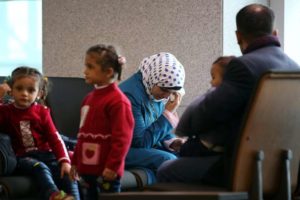by WorldTribune Staff, February 2, 2017
South Korea and Japan have been reluctant to take in refugees from Syria.
The United States admitted more than 10,000 Syrian refugees on former President Barack Obama’s watch.

Since 1994, 1,144 Syrians have requested asylum in South Korea, but refugee status has been granted to only three, government figures show.
As of October 2016, Japan had taken in just six Syrian refugees. Japanese Prime Minister Shinzo Abe told reporters in 2015 that the country needed to “look after its own.”
“Both Japan and South Korea are relatively wealthy societies that could afford to provide resettlement assistance to refugees,” said Phil Robertson, deputy director of Human Rights Watch’s Asia division. “There is a reluctance to have refugees become a part of that society.”
Ahmed Lababidi, a 23-year-old Syrian who lives on South Korea’s Jeju Island, an hour flight south of Seoul, was rejected for asylum. He told VOA News that the local immigration office informed him that fleeing war is not grounds by itself for refugee status in South Korea.
“They just say you are not a refugee,” he said the official told him. “Because it’s just war, you can stay here, but not as a refugee.”
Rights groups have accused South Korea of not fulfilling its commitment as a signatory of the United Nations Convention relating to the Status of Refugees, a treaty that defines who is a refugee and what responsibilities a host nation has in providing for that individual.
Robertson said South Korea’s humanitarian visas are an “artificial category” that “gives less rights” to asylum seekers, noting that Japan, too, has come under similar criticism in regard to its refugee policy.
An official at South Korea’s Ministry of Justice, who asked not to be named per office rules, said all asylum applications are “evaluated fairly” and consideration is given based on the circumstances in their home country as well as evidence of persecution.
Robertson said that South Korea’s policies toward Syrian or other asylum seekers stand in stark contrast to its generous resettlement program for North Korean defectors. He said it is hypocritical for Seoul to call on other nations to protect North Korean escapees when it does not offer the same treatment to refugees within its own borders.
South Korea’s Ministry of Justice confirmed on Feb. 2 that “civil war is not sufficient grounds for granting refugee status,” The Korea Observer reported.
A ministry official said Seoul is also concerned of the risk of sexual assaults which could occur should any migrants be allowed in.
“Judging by what we see in Europe, we would prefer to protect our women, rather than potentially place them at risk,” the official said.
